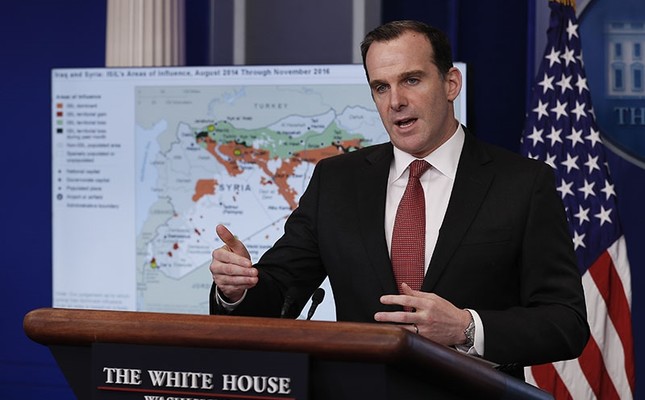London- Three senior US officials showed that Washington’s approach in Syria is based on halting the conflict between regime forces and rebels while focusing the fight against extremist groups such as ISIS and Nusra Front.
Particularly, US Special Envoy Brett McGurk said that his country is first and foremost committed to fighting off foreign fighters, among which are 40,000 who joined ISIS and Nusra Front ranks in Iraq and Syria.
None of the radicalized militants would be allowed to escape those two battlefields.
McGurk claimed that Idlib has turned into a “safe zone for Qaida terrorists on the Turkish border.” Such an assessment prompts chances of international forces working on overcoming the challenge that is extremist groups in Syria.
Not only are the US and Russia concerned, but also China who faces the ground facts of thousands of Uyghurs joining the Idlib-based Turkistan Islamic Party in Syria.
Turkey also has a stake in what becomes of extremists in Syria–particularly in the near-border governorate, Idlib.
POLITICAL SETTLEMENT AND IRAN’S EXIT
US Secretary of State Rex Tillerson said in a statement that Syria had turned out to be the sole arena providing the conditions and atmosphere for US-Russian cooperation.
For the first days of the new administration taking office, counterterrorism appeared to be a common interest providing the chance of Moscow and Washington coming together as far as that is concerned.
Tillerson later explained how Syria became an arena on which the extent of efficiency of that collaboration would be tested.
More so, a condition of US cooperation with Russia in Syria is the removal of Iranian forces from the country, Tillerson added.
“The direct presence of Iranian military forces inside of Syria, they must leave and go home, whether those are Iranian Revolutionary Guard forces or whether those are paid militias, foreign fighters, that Iran has brought into Syria in this battle,” said Tillerson.
The other condition, Tillerson added, was that the end result should be a unified Syria with “new leadership” — the removal of the Assad regime.
The US-Russian-Jordanian agreement for “de-escalation” in south-western Syria, is committed so far, as far as not killing civilians is concerned, which was a chief goal.
Massive bomb attacks and artillery attacks that killed many civilians have also been stopped.
Last Thursday, McGurk, the de facto head of the counter-ISIS coalition, spoke at a 90-minute panel on counterterrorism threats confronting the US, in which the Qaeda risk was also discussed. McGurk emphasized the need to focus on Qaeda in Idlib with the same intensity they have with ISIS and shut down the networks that fuel the organization in Syria.
McGurk said Idlib had become a Qaeda safe haven. In a July 27 interview, he told the New Yorker, “We are going to have to work with the Turks and others to degrade this presence.” Turkish officials believe that by “others,” McGurk means the YPG.
